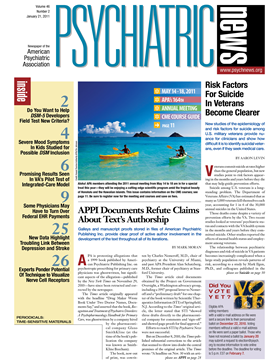Psychiatrists and other mental health professionals have an unprecedented opportunity to be a part of the revision process for the fifth edition of the Diagnostic and Statistical Manual of Mental Disorders (DSM-5). The American Psychiatric Institute for Research and Education (APIRE) is conducting field-trial testing of proposed changes to DSM-5, giving participating psychiatrists the chance to use the draft diagnostic criteria and assessment measures with actual patients and provide feedback to the DSM-5 developers about their usefulness.
One version of the field trials taking place in large, academic medical centers was launched last month. This second version of field testing, focused in routine clinical practice settings, is scheduled to begin this month and will continue throughout 2011. Recruitment of mental health professionals for the second version is ongoing.
“Our hope is that the proposed revisions in DSM-5 will better fit patients' diagnostic status and capture changes in their symptom levels over time. This will be helpful for treatment planning as well as diagnostic assessments,” said Darrel Regier, M.D., M.P.H., executive director of APIRE and vice chair of the DSM-5 Task Force. “Earlier editions of DSM provided only limited opportunities for solo- and small-practice clinicians to have a voice in the revision process, and we believe that including such individuals in our field trials will give us a better sense of DSM-5's real-world impact on psychiatrists and their patients.”
To participate in the field trials, clinicians must be licensed to independently make DSM diagnoses. Participation involves using the proposed diagnostic criteria and assessment measures to evaluate two randomly selected patients, one new to the clinician's practice and the other an established patient. Two clinical interviews, scheduled four to 12 weeks apart, will be conducted per patient. For both the established and new patients, the baseline interview will involve a full diagnostic evaluation; the second interview is a clinical follow-up. To simplify and facilitate use of the proposed measures, clinicians will complete assessments and document findings using a secure Web-based data-entry system. Patients will also use this system to complete assessment forms and provide feedback to DSM-5 developers about whether the forms were helpful.
The Practice Research Network—a program within APIRE that conducts practice-based research among psychiatrists in the United States—is leading the routine clinical practice field trials and the recruitment efforts for this important arm of the DSM-5 field trials. Volunteers will complete approximately two hours of online training, including a course on ethical issues in human-subject research for volunteers who do not have current certification in human subjects protection. Staff will be available throughout the study to address any questions or concerns that arise. In return for their time and efforts, participating clinicians will receive continuing education credits and will have their names listed in DSM-5 as field trial participants.
Regier emphasized that a large number of volunteer psychiatrists are needed so that data can be gathered for patients of all ages with a full range of diagnoses. Interested clinicians should visit <www.psych.org/dsm5-rcp-fieldtrials> for further information. Questions can also be submitted via e-mail at [email protected] or by phone at (800) 713-7123. 
